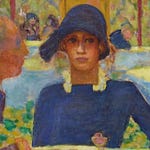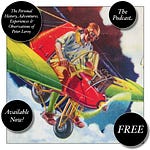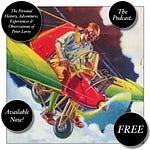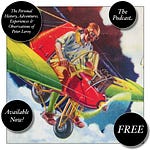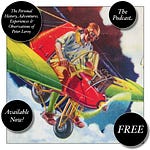“I couldn’t help overhearing,” said a voice from behind them.
It was Mr. Locke, the principal of the high school. Joining the group, he moved in behind them, tossed his arms in a comradely way across the shoulders of the Leroy boys, and embraced the entire trio, pressing himself, at the height of the embrace, up against my mother’s teenage bottom. My mother turned to give him what she meant to be a withering look, and in turning she noticed her parents, my grandparents, Gumma and Guppa, standing a bit apart from the crowd, watching the fire with everyone else, but wearing the queerest smiles, as if something in the fire brought them pleasure. Those queer smiles puzzled my mother, for they raised the heretofore unthinkable possibility that the fire might bring someone something like pleasure, and that possibility seemed to say something about how individual our responses to events are, even to events that seem to have such universal significance. That thought made my mother realize that she, too, had been taking a kind of pleasure from the fire, that it seemed somehow to have shown her how much she loved Buster. She wanted to draw the attention of Bert and Buster, and even Mr. Locke, to the queer smiles her parents were wearing and find out what they made of them. She decided to speak, to wonder aloud whether her parents’ queer smiles might not contradict everything she and Buster had just suggested about the fire and the universality of its effect on its audience.
“Gee,” she began, but her attention was diverted from her own thoughts when Mr. Locke stopped squeezing the shoulders of the Leroy boys and turned his attentions to her shoulders instead. While kneading her, he continued his own remarks, thus:
“If I may paraphrase what you’ve been saying, the fire is such a spectacular event that it seems as if it ought to be more than merely what it apparently is—a big fire. It seems as if it ought to be a sign of something, something that, to judge from the compelling brilliance of its sign, must be particularly significant for those it has drawn to it, attractive nuisance that it is.”
“Yes, sir,” said Buster.
“We have the feeling, don’t we, that the fire, this sign, and this moment when it has appeared to us, must mark the end of something—or—and here we think of the Phoenix, don’t we?—the beginning of something. Some of those gathered here, I’m sure, will find that it marks the end of childhood and the beginning of manhood—or”—and here he kneaded my mother with increased vigor—“womanhood. Others will discover, because popular songs have taught them to look for this particular discovery in nearly every significant moment, that it marks either the first spark of love or its last dying embers.”
My mother blushed, but in the rosy glow of the fire, it’s unlikely that anyone noticed.
“And in the years to come,” Mr. Locke went on, “I fear that this night, this fire, this moment, may seem like even more of a portent.”
“How so, sir?” asked my father. He jabbed my mother in the ribs and winked when she looked at him.
“When the sound of sirens has come to inspire in us a terror that we haven’t had to confront before,” said Mr. Locke, “we are all going to remember this fire and we are going to be mightily tempted to see it as a sign of something—especially as the end of something, as the end of our halcyon days. Perhaps I ought to say the end of your halcyon days. Mine—well, that’s beside the point. Then, I think, when everything seems to have come apart, when everything seems to have gone up in smoke, you may see this fire blaze again—in recollection, that is—and say to yourself, ‘My world was on fire that night, and the innocence of my youth went up in the flames.’”
“What’s he talking about?” my father asked in a murmur.
“The war?” suggested my mother.
“Yeah,” said Buster, with clenched jaw.
“But does it?” asked Mr. Locke.
“Jeez, he’s unstoppable,” muttered my father.
“Does it what?” asked my mother, who had gotten a little lost.
“Does it mean any of those things?” Mr. Locke asked. “Does it mean anything?”
My mother, my father, and Buster stared at the burning building. The flames illuminated their young faces. My mother seemed entranced. She wore a blissful smile. She was quite certain that the fire would always mean something to her, that as the years passed she would look back at the night the Nevsky mansion burned as the night she chose Buster.
Buster’s jaw was still set, and in the fire he saw its horrible meaning: the inevitable coming of the war.
My father blinked into the light, annoyed with himself for not seeing in it a sign of anything. Does it mean anything? he wondered.
“No,” said Mr. Locke, answering his own question. “It means nothing, nothing at all. The cosmos doesn’t work that way. It sends us no signs. It has no meaning. It sweeps along, full of sound and fury, signifying nothing.”
My mother knit her brows and held Buster tighter still. Buster frowned into the light of the fire, but he returned my mother’s squeeze with a kind of grim protectiveness that worried her. My father smiled.
“I know where that’s from,” said my father.
“Good for you, Buster,” said Mr. Locke.
“Bert,” said my father.
“Of course,” said Mr. Locke, with a chuckle. He seemed to think that my father was mistaken but should be humored. “The meanings we find in events are ours alone. The meanings follow after the events, the laggard stepchildren of the facts. Our reason struggles to keep up, to make sense of it all, but we don’t make sense of it all, we manage only a patchwork of attempts to make sense of it, because we’re trying to make sense of things for which sense is a completely irrelevant notion.”
He gave my mother’s shoulders a final squeeze, pressed himself once again against her bottom, and walked off into the chilly darkness outside the rosy ring of the fire.
“Thanks a lot, Mr. Locke,” muttered Buster. “Next time, keep your ideas to yourself.”
“Keep your hands to yourself,” said my father.
“And that’s not all,” said my mother.
[to be continued]
Have you missed an episode or two or several?
You can begin reading at the beginning or you can catch up by visiting the archive or consulting the index to the Topical Guide. The Substack serialization of Little Follies begins here; Herb ’n’ Lorna begins here; Reservations Recommended begins here; Where Do You Stop? begins here; What a Piece of Work I Am begins here; At Home with the Glynns begins here.
You can listen to the episodes on the Personal History podcast. Begin at the beginning or scroll through the episodes to find what you’ve missed. The Substack podcast reading of Little Follies begins here; Herb ’n’ Lorna begins here; Reservations Recommended begins here; Where Do You Stop? begins here; What a Piece of Work I Am begins here; At Home with the Glynns begins here.
You can listen to “My Mother Takes a Tumble” and “Do Clams Bite?” complete and uninterrupted as audiobooks through YouTube.
You can ensure that you never miss a future issue by getting a free subscription. (You can help support the work by choosing a paid subscription instead.)
At Apple Books you can download free eBooks of Little Follies, Herb ’n’ Lorna, Reservations Recommended, and Where Do You Stop? and What a Piece of Work I Am.
You’ll find overviews of the entire work in An Introduction to The Personal History, Adventures, Experiences & Observations of Peter Leroy (a pdf document), The Origin Story (here on substack), Between the Lines (a video, here on Substack), and at Encyclopedia.com.





